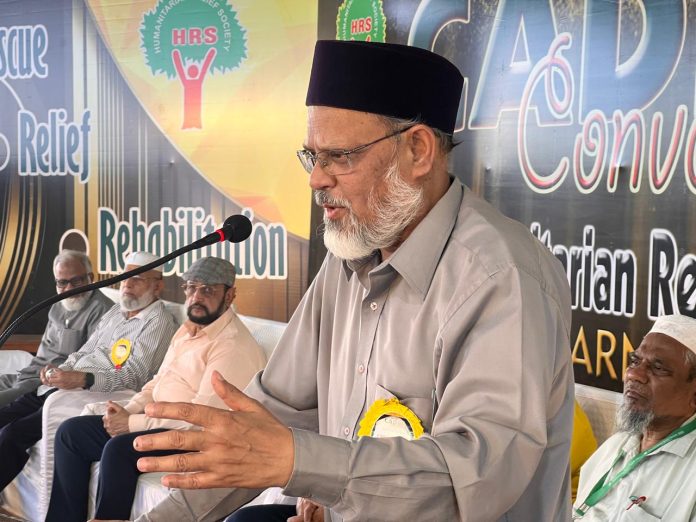– Muhammad Talha Sidi Bapa
Hassan: The sound of an explosion sent a wave of urgency through the training grounds. Within moments, teams of volunteers, clad in rescue gear, sprang into action – administering first aid, securing the wounded, and directing emergency evacuations. This was not a real disaster but a high-intensity mock drill at the Humanitarian Relief Society (HRS) two-day state-level convention at Alur Mansoorah School Campus in Hassan, held on February 1st and 2nd. The goal: to prepare volunteers for real-world emergencies where every second counts.
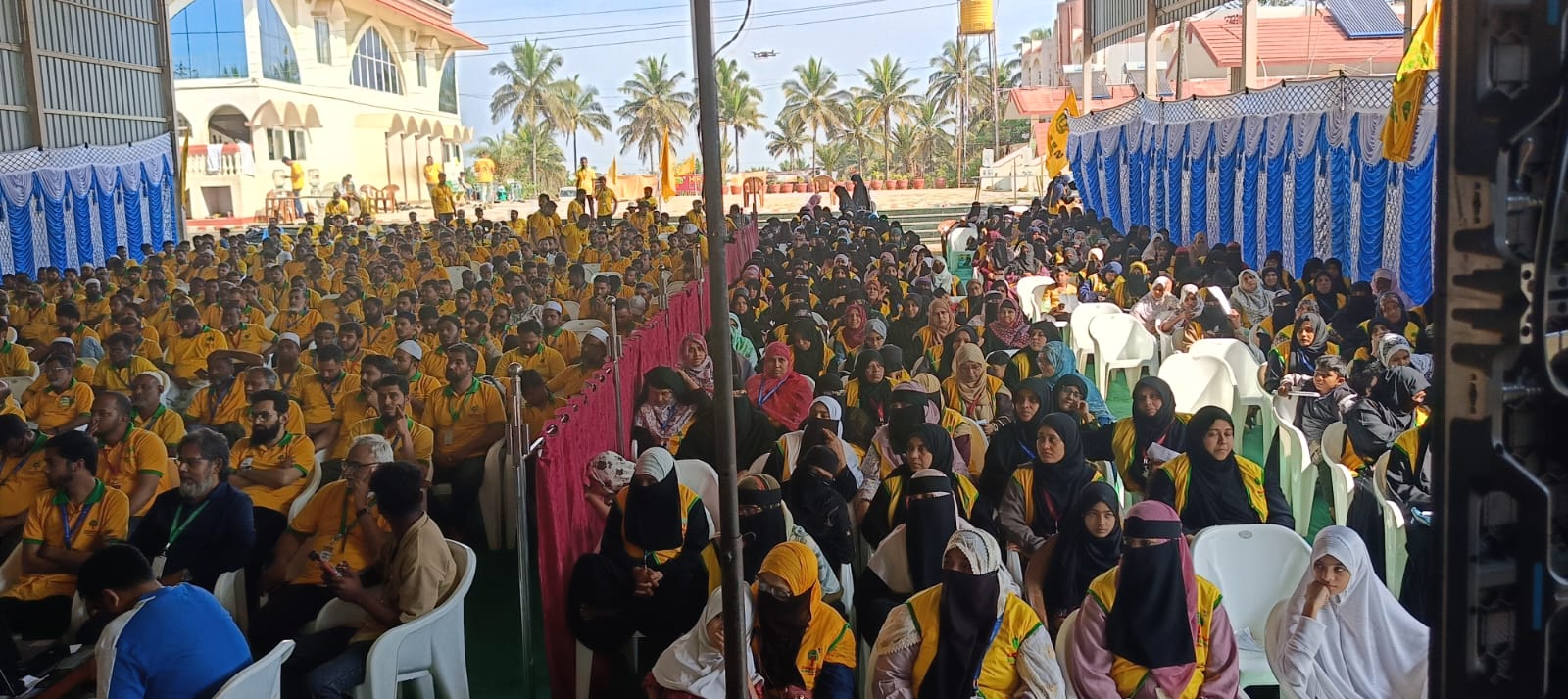 With disasters striking unpredictably – be it earthquakes, floods, or major accidents – the need for trained first responders has never been greater. Recognising this, HRS gathered hundreds of volunteers from across the state, equipping them with critical skills in disaster response, first aid, trauma management, and crisis intervention. Among them were young men and women, united in their commitment to humanitarian service.
With disasters striking unpredictably – be it earthquakes, floods, or major accidents – the need for trained first responders has never been greater. Recognising this, HRS gathered hundreds of volunteers from across the state, equipping them with critical skills in disaster response, first aid, trauma management, and crisis intervention. Among them were young men and women, united in their commitment to humanitarian service.
A Mission of Service and Sincerity
The convention opened with a keynote address by Mohammed Atherulla Shariff, who set the tone for the event. He urged the volunteers to carry out their service with sincerity, seeking reward only from Allah rather than worldly recognition. He emphasised that true success lies in selfless humanitarian work, performed purely for the sake of Allah, without a desire for fame or publicity.
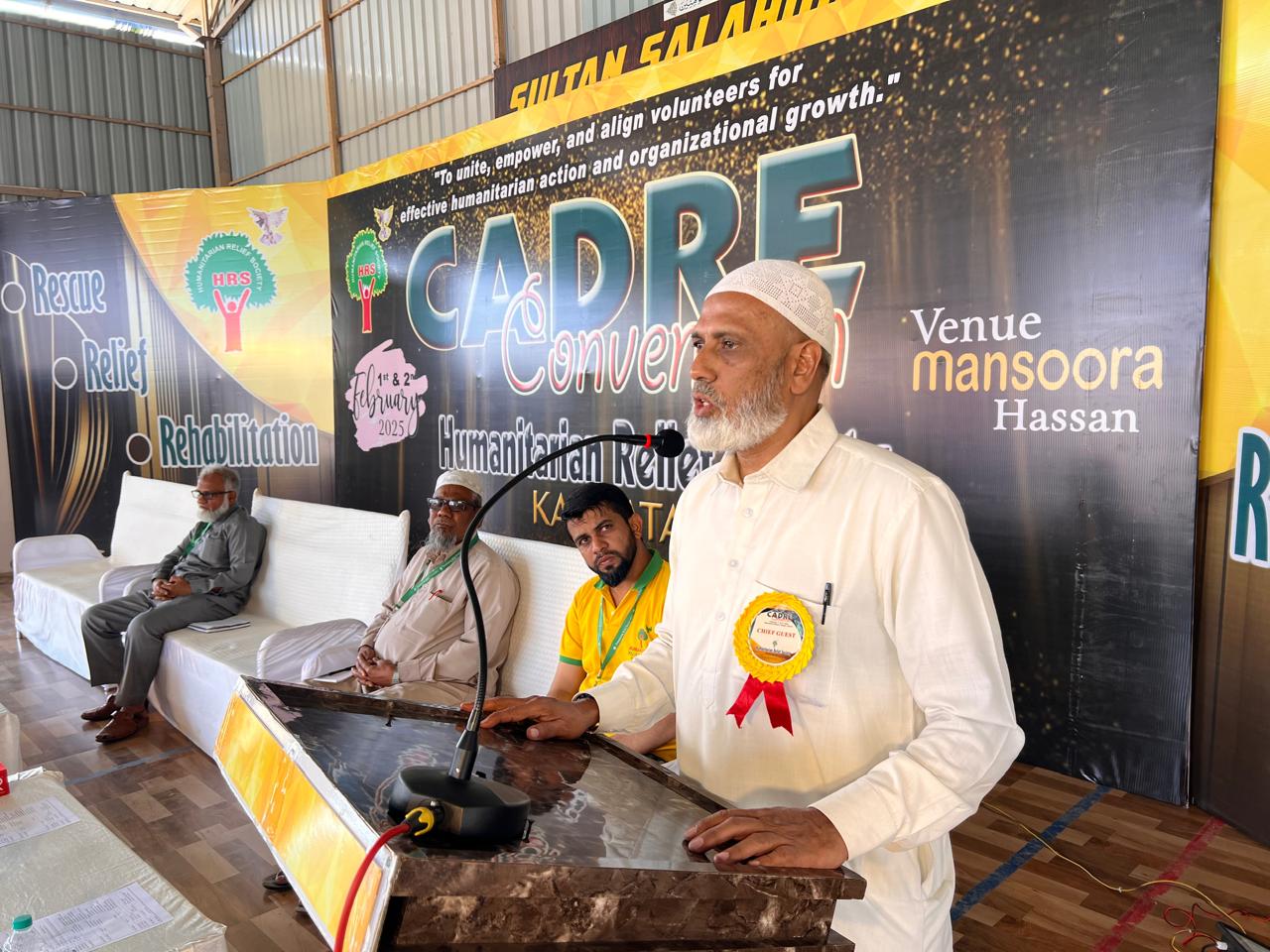 His words reminded the audience that every act of kindness, when performed with sincerity, brings immense reward in the Hereafter. This heartfelt message deeply inspired participants, strengthening their commitment to serve humanity solely for the pleasure of Allah.
His words reminded the audience that every act of kindness, when performed with sincerity, brings immense reward in the Hereafter. This heartfelt message deeply inspired participants, strengthening their commitment to serve humanity solely for the pleasure of Allah.
Shariff also reflected on the legacy of Ibrahim Saeed, the visionary behind HRS. He noted that if Saeed were alive today, he would have been pleased to witness the organisation’s growth and the sight of men and women standing together for a common cause. His foundational work in structured relief efforts continues to guide the organisation’s mission.
Prioritising Relief Distribution
Maqbool Ahmed, a retired IPS officer from Gujarat and founder of the Society for Bright Future, delivered a keynote address on the importance of prioritising aid distribution in disaster scenarios. He emphasised that relief workers must first gather accurate data before distributing essential supplies.
“Our relief efforts must first reach women and children – the most vulnerable sections of society,” he asserted. He also stressed the importance of involving local leaders in relief distribution to ensure fair and transparent aid allocation.
Practical Training & Real-Time Simulations
One of the event’s most gripping moments came during a real-time disaster simulation. Just as experts were discussing trauma management, a staged explosion triggered an immediate rescue response. Volunteers navigated chaos, applied first aid, and ensured swift medical transport, mimicking real disaster conditions.
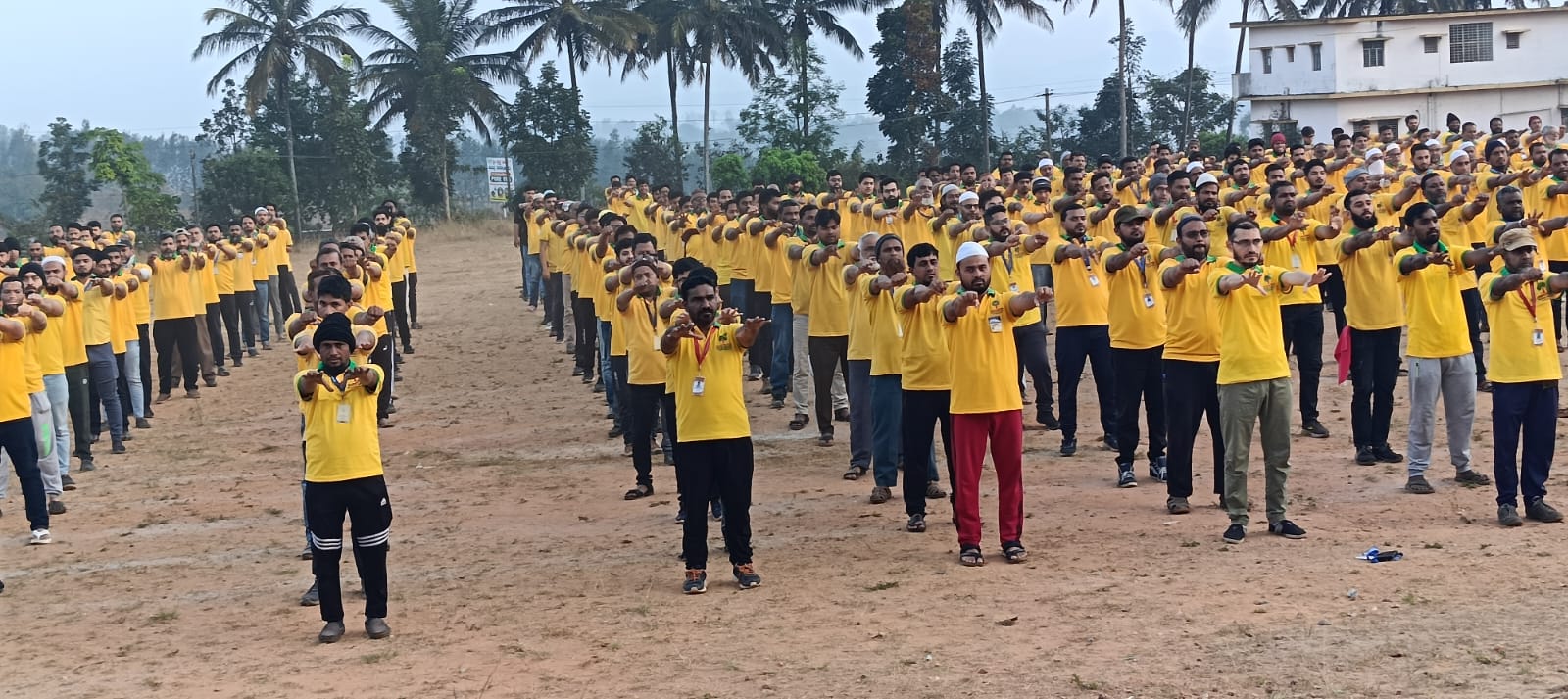 “Our goal is to prepare them for real crises,” said Mohammed Markada, General Secretary of HRS. “In high-stakes situations, rapid decision-making and teamwork can save countless lives.”
“Our goal is to prepare them for real crises,” said Mohammed Markada, General Secretary of HRS. “In high-stakes situations, rapid decision-making and teamwork can save countless lives.”
Beyond simulations, medical professionals provided training on physical endurance, nutrition, and stress management, ensuring volunteers could perform under extreme conditions.
Building Physical & Mental Resilience
The second day of the convention began with an early morning physical training session, where volunteers engaged in strength-building exercises, endurance drills, and team-building activities. Experts emphasised the role of physical fitness in disaster response, demonstrating techniques to help volunteers sustain energy during extended rescue operations. The session reinforced the necessity of being mentally and physically prepared for unpredictable emergency scenarios.
Women in Disaster Response
A standout feature of the convention was the active participation of women. In what was traditionally a male-dominated field, Muslim women volunteers trained alongside their male counterparts, learning rescue operations, medical aid, and psychological support for trauma victims.
One participant, Dr Saba, expressed her newfound confidence: “Before this training, I never imagined myself on the front lines of disaster relief. Now, I know I can make a real difference.”
Addressing Gaps in Emergency Preparedness
A crucial panel discussion, “Challenges Faced During Emergencies,” featured experts from across the humanitarian sector, including Tanveer from Mercy Mission, Najeeb from Kerala’s People’s Foundation, and Mohammed Umar from Project Smile.
Led by Dr. Naseem Ahmed of the Solidarity Youth Movement, the session examined the logistical and psychological challenges of disaster response. Volunteers raised pressing concerns, including how to prevent corruption, ensure ethical aid distribution, and navigate government bureaucracy while securing necessary support. The panellists provided practical strategies for maintaining transparency and leveraging government assistance effectively, ensuring humanitarian efforts remain uncompromised by administrative hurdles.
A Race Against Time
In his closing remarks, Dr. Mohammad Saad Belgami, Ameer of Jamaat-e-Islami Hind Karnataka, underscored the importance of the “Golden Hour” – the critical first 60 minutes after a disaster.
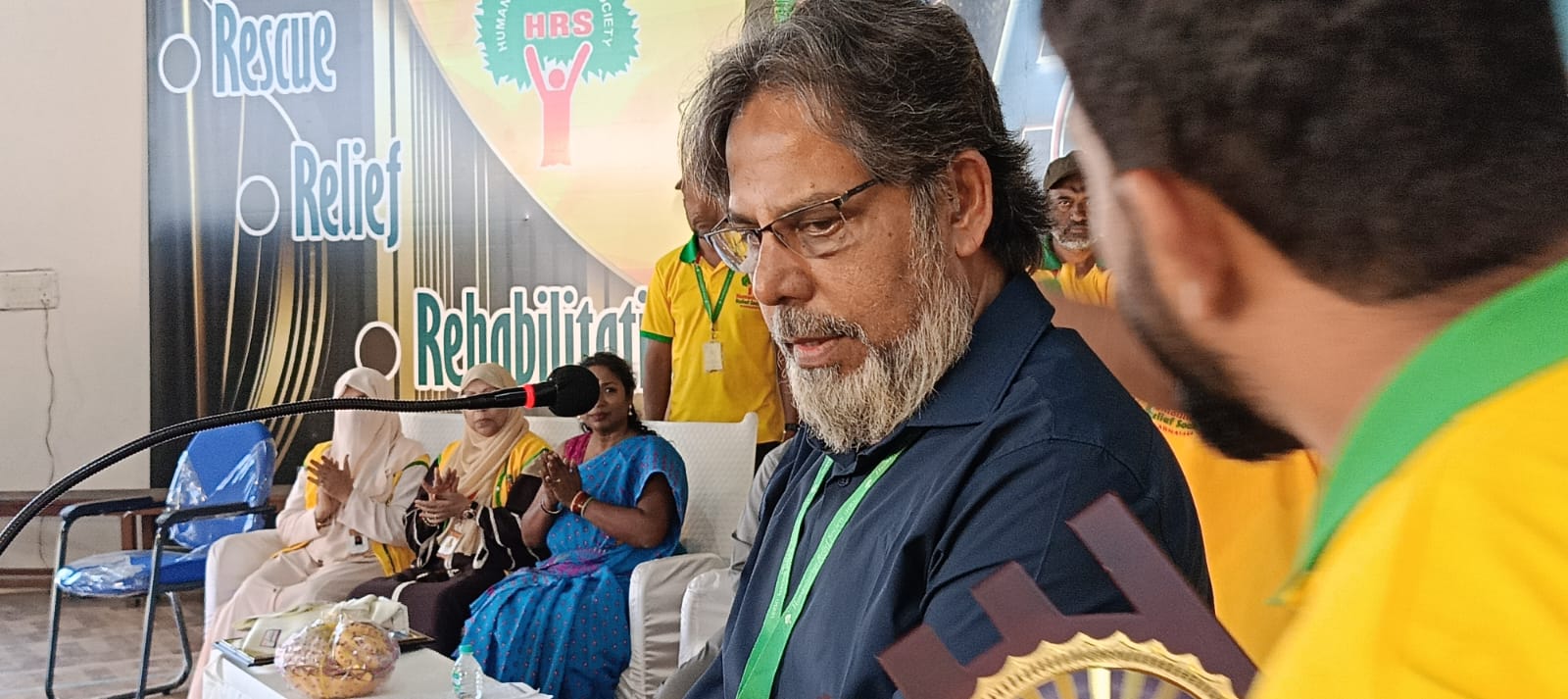 He emphasised the need for volunteers to remain firm in their belief and purpose, reinforcing that their commitment to saving lives should be unwavering.
He emphasised the need for volunteers to remain firm in their belief and purpose, reinforcing that their commitment to saving lives should be unwavering.
“A single well-timed decision during this window can mean the difference between life and death,” he said, urging volunteers to continually sharpen their skills and remain ever-prepared for emergencies.
Strengthening the Spirit of Service
To reinforce their commitment, volunteers participated in a cultural session, showcasing na’ats, poetry, and dramatic performances that reflected the essence of humanitarian work. A campfire gathering allowed participants to bond over shared experiences, exchanging stories of challenges and triumphs.
As the convention concluded, volunteers departed with more than just training certificates – they carried a renewed sense of purpose. With practical skills, expert guidance, and a spirit of service, these individuals are now better equipped to respond to crises, ensuring that when disaster strikes, help will be swift and effective.
With HRS strengthening its reach and impact, this convention marked a milestone in developing a prepared and resilient community, ready to rise to any challenge.


